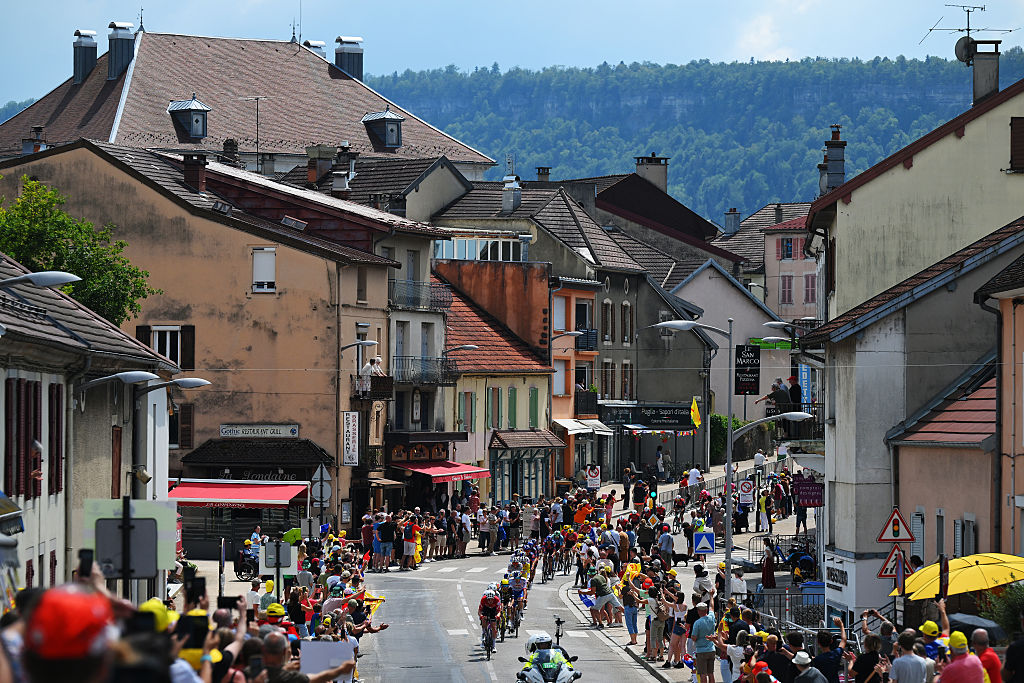'My town really exists' – the political power of the Tour de France
A new paper suggests that the Tour de France could reduce support for the far-right


The latest race content, interviews, features, reviews and expert buying guides, direct to your inbox!
You are now subscribed
Your newsletter sign-up was successful
I’ve never been to the Tour de France, but I did go to Geraint Thomas’s farewell finish at the Lloyds Tour of Britain last month. In place of crowds of polka-dot jerseys and rainbow bucket hats were hoards of supporters out to wave their countryman home. The national pride was palpable, not just in the form of countless monumental Welsh dragon flags, but in the fondness with which people talked about the rider they shared their home with.
The Tour de France is, albeit, a heftier affair. Watched by a peak domestic audience of 8.2 million, it’s one of the most watched sporting events in the world, after the football World Cup and the Olympics. It snakes its way through the country on a different course each year over four to six hour-rides, passing major towns and smaller ones wherever the stage race destinations dictate. But it might have an additional power we hadn’t previously realised, too.
New research by academics from the University of Zurich and Bocconi University have released a working paper linking a reduction in votes for the far right in the towns the Tour journeys through.
In ‘Cycling Through Elections: The Political Consequences of the Tour de France’, the researchers found that in the areas the Tour moved through, support for the far right declined by a 0.33 percentage point between 2002 and 2022 in presidential elections, and by a 0.44 percentage point in elections to the National Assembly.
However, the decline was even more prominent in poorer areas affected by deindustrialisation, weak labour markets and population decline, all of which are central in the rise of the far-right.
“So for us, this was already very interesting because it speaks about why people vote for the far right,” Ala Alrababah, who co-authored the paper with Germain Gauthier, Adam Polak and Maelle Delouis-Jose told Cycling Weekly.
“The idea is that people might be feeling left behind or feeling neglected or invisible, especially in some rural areas, compared to more cosmopolitan urban areas.
The latest race content, interviews, features, reviews and expert buying guides, direct to your inbox!
“Regardless of your political views, it’s not good when voters feel excluded, that they’re not part of the national conversation," Alrababah continued.
"So, we looked at the types of interventions that gave people some sort of symbolic pride and recognition."
Support for the far-right had fallen in places that the Tour passed through, in part due to the economic benefit and part because of the local pride the Tour inspired in the communities it visited - a sense that their town was part of the national story of France, and its Tour.
“It looked like our town was actually important,” one spectator told the researchers after a 2025 stage, another writing that it made them feel “as if my town really exists”. “It brought people together, it made me love my town more,” another wrote.
Beyond the symbolic, the Tour brought real economic benefits, too. Local GDP per capita was boosted by 0.14%, or €56 relative to the national average. And the positive impact of the Tour, both symbolic and economic, was further boosted by a French stage winner. In a race increasingly global in its outreach and representation (though fewer than 1% of WorldTour riders are Black), being part of a "national moment" like a home stage-win, can be powerful.
“These cases suggest that a French rider’s presence on television, cheered by clearly invested supporters, can make entire communities feel recognised,” the researchers explained.
The research is clear: support for the far-right grows in places that feel forgotten. But the study shows that an event even as transient as the Tour de France can have a powerful impact on voting, reducing support for far-right or far-left parties, in favour of more traditional moderate parties. It has a “depolarising effect”.
What can this teach us about the impact of sport on politics? As support for the far right is grows here at home, and wider afield, examples of “place-based interventions” - events that bring communities together in celebration of their homes - can have a powerful impact on not only the perception of where you live, but on your perception of the world more widely, and your place in it.
Of all the years combed for data during their research, the team found that 2022 was the most successful year for far-right parties. And yet, the Tour de France was responsible for a 0.13 standard deviation reduction in the presidential election and a 0.16 standard deviation reduction in the legislative election, in the year Marine Le Pen was up for election.
“The issue is people feeling neglected, and excluded by the urban elites. I don’t think that the answer to everything is cycling. But it starts with interventions that give people these feelings [of pride and connection], but you need to address the structural disadvantages that these areas have in the first place in order to reduce feelings of neglect and invisibility among people.”
But cycling has the power to be a catalyst.

Meg is a news writer for Cycling Weekly. In her time around cycling, Meg is a podcast producer and lover of anything that gets her outside, and moving.
From the Welsh-English borderlands, Meg's first taste of cycling was downhill - she's now learning to love the up, and swapping her full-sus for gravel (for the most part!).
You must confirm your public display name before commenting
Please logout and then login again, you will then be prompted to enter your display name.